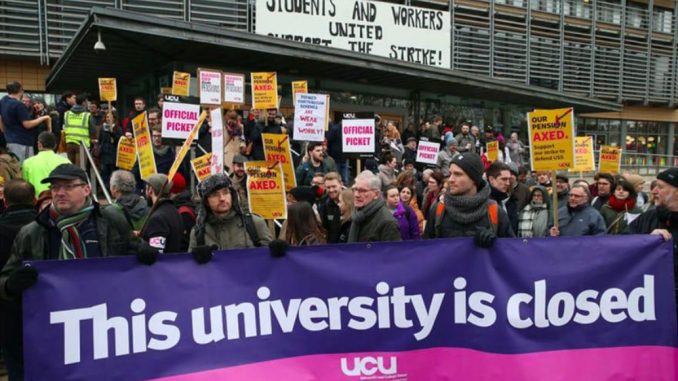
Author: Ronney Turus
70 000 staff at 150 universitates will strike on 24, 25 and 30 November if there isn’t any agreement between the union and universities. The strike will affect 2.5 million students across the country.
UCU (the Universities and Colleges Union) general secretary Jo Grady said: ‘Campuses across the UK are about to experience strike action on a scale never seen before. 70,000 staff will walk out and make clear they refuse to accept falling pay, cuts to pensions and insecure employment.
‘This is not a dispute about affordability – it is about choices. Vice-chancellors are choosing to pay themselves hundreds of thousands of pounds whilst forcing our members onto low paid and insecure contracts that leave some using foodbanks. They choose to hold billions in surpluses whilst slashing staff pensions
‘If university vice-chancellors don’t get serious, our message is simple – this bout of strike action will be just the beginning.’
The universitates in the UK made a record income of £41.1 billion last year with vice chancellors combined earning estimated to be £45 million
UCU demands are pay rise which is in line with cost of living and inflation, on pension UCU wants the employer to reverse the cuts which will cause an average member to lose about 35% from retirement. And end to insecure contracts.
The ballot is the first time the union succeeded in winning an aggregated campaign. The turnout for the ballot was 57.71% and 81,14% voted for strike action. The anti-union laws make it very difficult to take collective actions. The law requires staff in each university to vote with minimum 50% turnout and those who voted should vote with minimum 50% ‘yes’ for a strike action. However, this time the union called a collective ballot in contrast to individual university balloting.
The union leadership ran an effective campaign to secure turnout this time with a seven-week ballot period. Online rallies, a range of public activities and local activists’ involvement have succeeded.
The university staff were offered only a 3% pay rise last year despite a rampant inflation that keeps rising. Workload, stress, and never ending demands on university staff have been increasing every year. The inequality in pay resulting from gender, disability, ethnicity are still factors that continue. Many university lecturers are relying on short-term precarious contracts.
The universities in the UK were free until 1998. The Labour Party leader Tony Blair introduced the fees in 1998. The fees were very small at the time but it had opened the floodgate for much higher charges. The fees increased to £9000 per year in 2010 and then £9250 since 2017. A 23-year-old undergraduate can end up with £45 000 student loans after completing their course.
High profile universities, Russell Group, find the fee of £9250 for home students inadequate and demand higher fee introduction for home students. Overseas students could be charged up to £20 000 per year.
Nevertheless, the determining factor will not be the strike that UCU members are preparing for. The nurses, teachers, railway workers, communication workers, public sector workers are balloting or have balloted their members. The determining factor will be how to move forward. Can all the strikes have coordinated into a general strike? Or with words of the union leader “into a coordinated and synchronised action.”
The general strike is illegal in the UK. If the workers don’t challenge this perception now then when?








